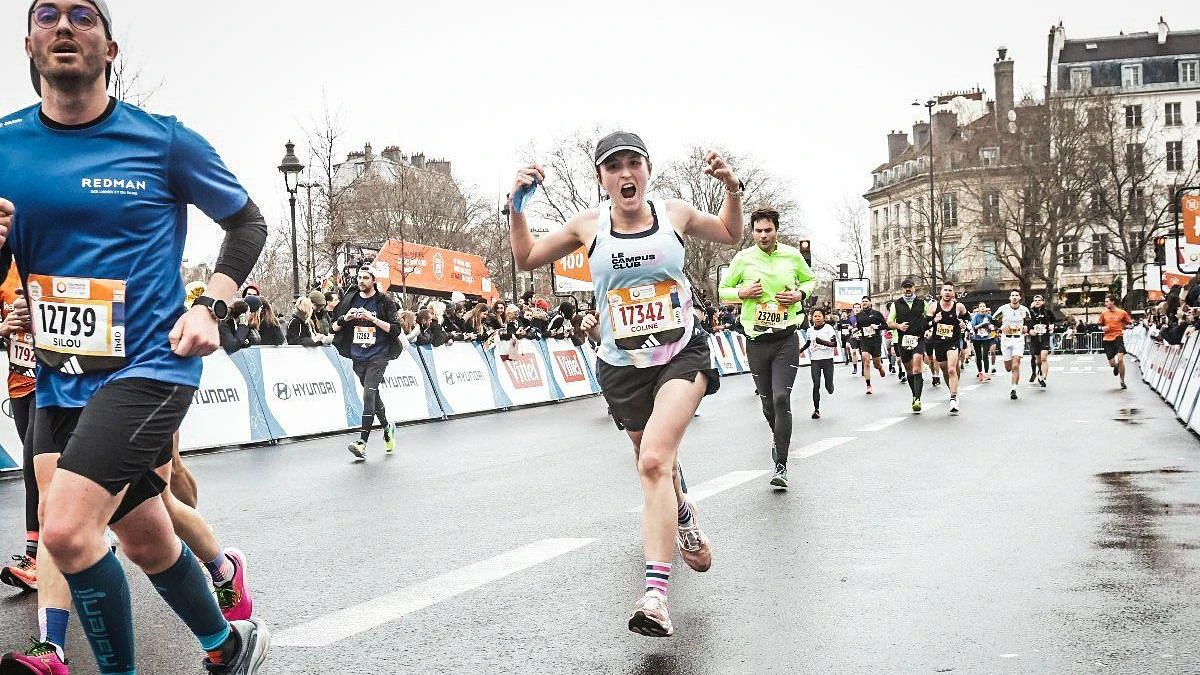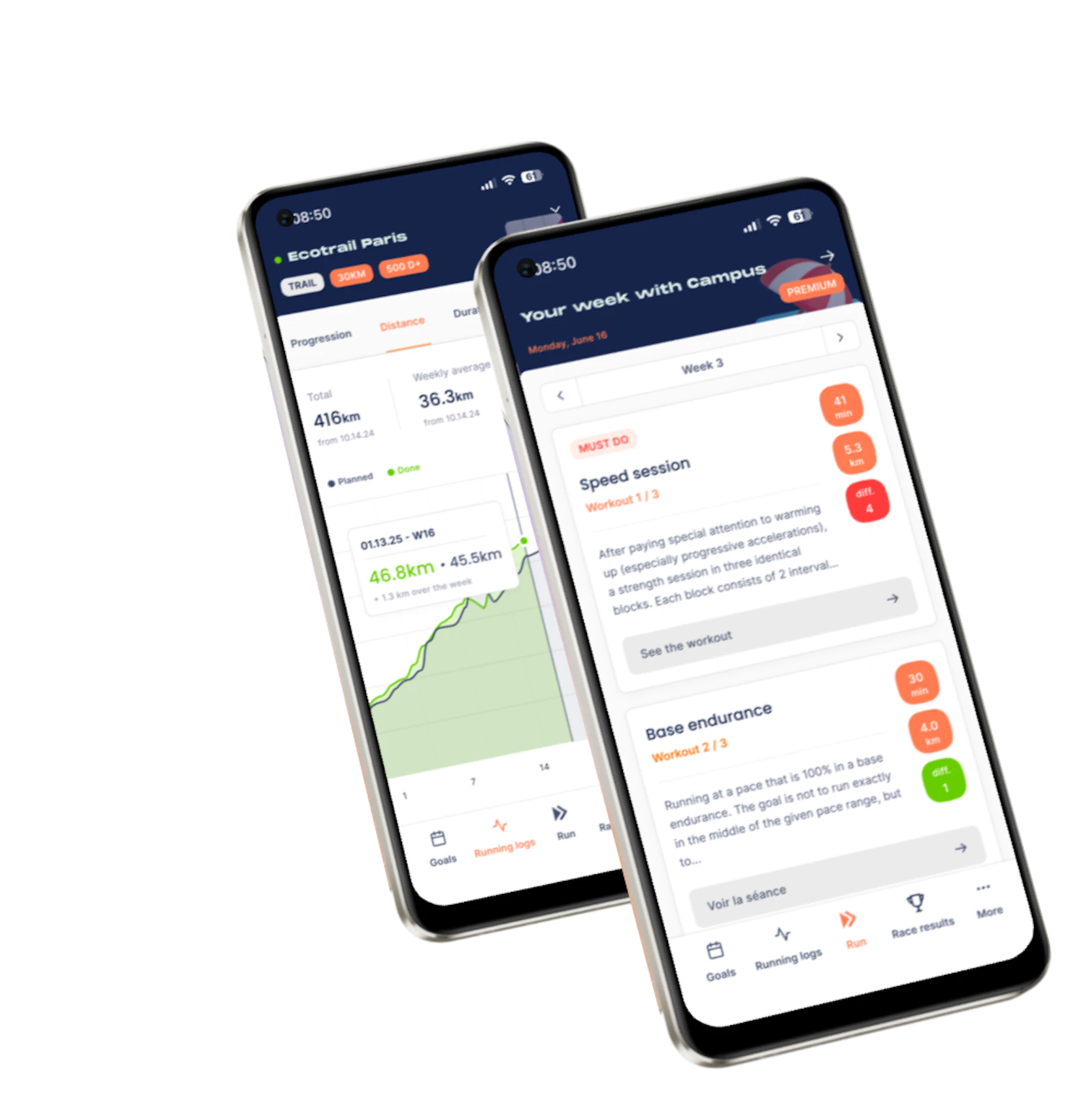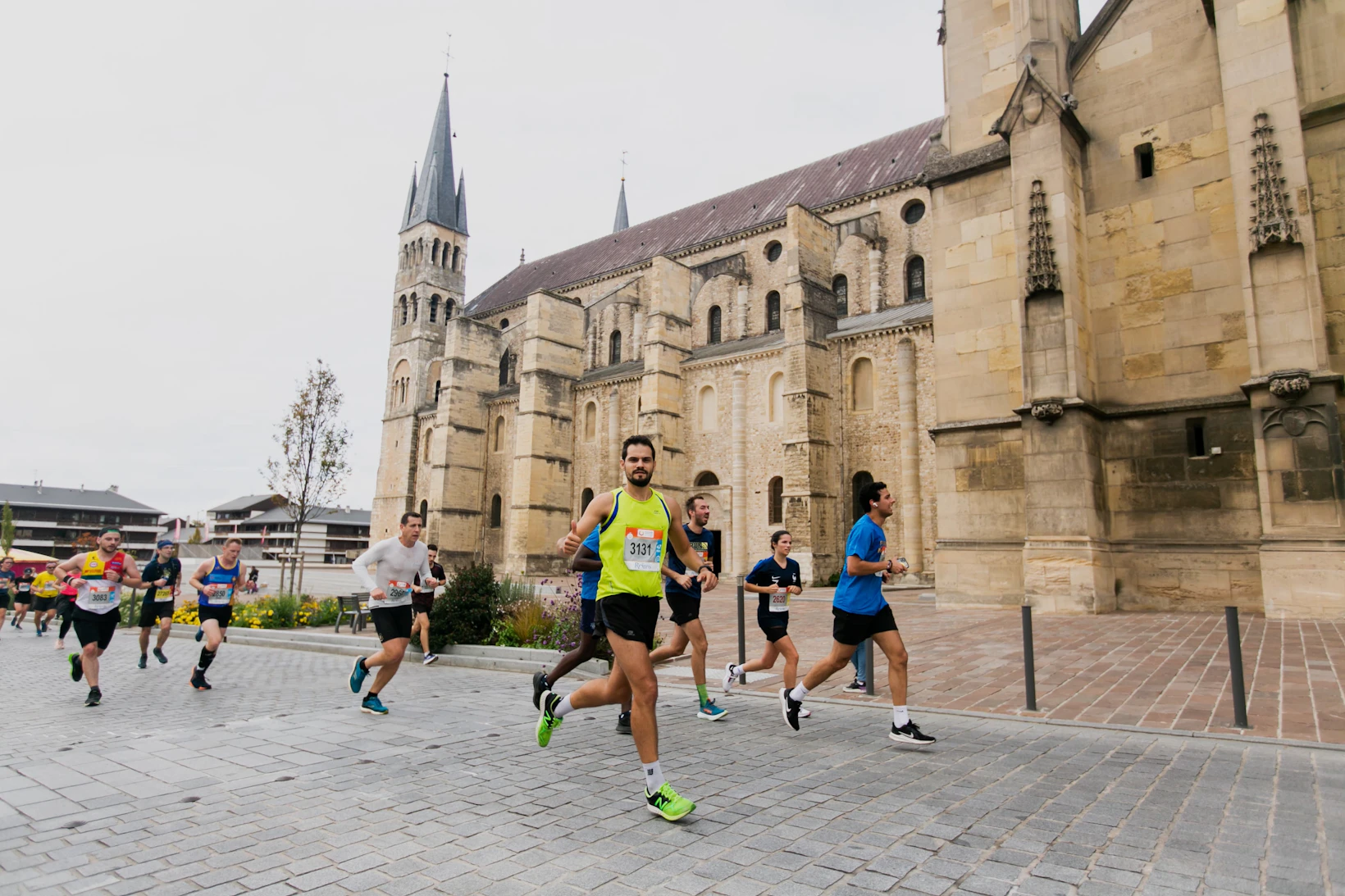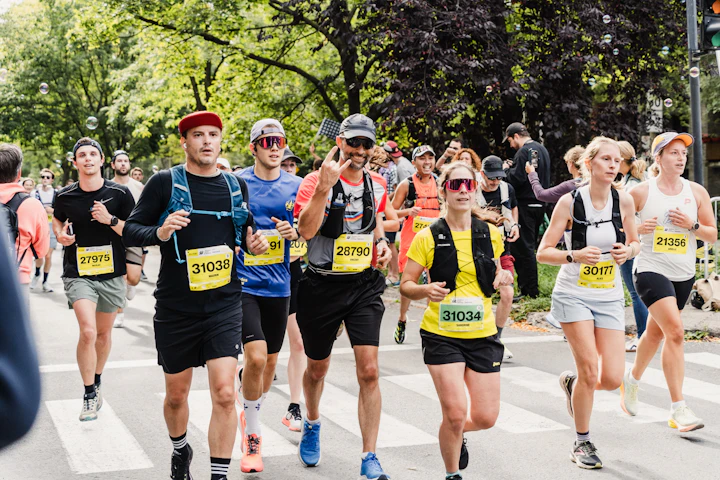Marathon preparation lasting 6 months: Pros and Cons

17 min read
Summary
6-month marathon prep: the pros
1. Opportunity to focus on the general preparation phase for beginners (during 3 months)
🫀 Development of base endurance (focus on heart rate)
💨 Optimization of aerobic capabilities
💪🏾 Muscle strengthening
2. Greater progression in the specific development phase (during 2 and a half months)
💥 MAS training and speed sessions
🏃🏽♀️ The long runs to get familiar with the marathon distance
📈 The marathon pace to increase your resistance threshold to long and "fast" effort
3. A tapering phase well-tuned (over 3 weeks)
Extras of a 6-month marathon preparation
⏱️ Fine-tuning time goals, assessing progress and current level
🍝 Establishing a well-crafted plan for nutrition and hydration
6-month marathon prep: the cons
Answers to the questions you might have
📆 What is the preparation time for a marathon?
🤔 Can I prepare for a marathon in 6 months?
🙈 How to prepare for a marathon from 0?
🔎 What is the right time for a first marathon?

Receive advice from our passionate coaches!
Are you considering a 6-month marathon training? Do you want to confirm that you've made the right choice regarding such a comprehensive training plan? You are in the right place. We've objectively reviewed the pros and cons of a 6-month marathon prep, to make you aware of the benefits and limits of half a year of training towards a specific goal (yes, when said like that, it does sound long and bold, and it is… but trust us, it's worth it!). Let's go! 🤸♀️
6-month marathon prep: the pros
As you might imagine, 6 months of training is no small feat. It represents long months of work and, if done correctly, hard work always pays off (well, that's what we added). Here are the benefits you can gain from a 6-month marathon preparation.
1. Opportunity to focus on the general preparation phase for beginners (during 3 months)
The general preparation phase is essential for any training plan. It helps to develop the basic physical capacities of an athlete to optimize their potential and prepare them to handle the workload that follows in their prep (hello specific development phase👋). It is therefore essential for athletes who are new to running(. If that's you, know that this phase will last longer than if you were an experienced runner, but no panic: everyone progresses at their own pace(. If you are a dedicated runner returning to running after a well-deserved break, the general preparation phase will even be preceded by a resumption phase lasting one to two months, during which you'll do 50% of your usual mileage in easy run exclusively(.
Meanwhile, the general development phase lasts from 4 to 12 weeks depending on the athlete's level, their goal, and the prep time available(. So, it's clear that, during a 6-month marathon prep, there's enough time to carefully go through this critically important stage

🫀 Development of base endurance (focus on heart rate)
Base endurance is the foundation of any training plan. On its own, it should account for approximately 70% of your weekly training volume. It involves a slow running pace — at 65 to 75% of your Maximum Heart Rate (MHR) — which promotes physiological adaptations without causing excess muscle fatigue (like that experienced after specific workouts) Base endurance occurs during easy runs or Long runs. As we said, it's vital to keep an eye on your heart rate when running at base endurance… For some, this pace corresponds to brisk walking, and that's ok(! Over time, with training, these athletes will be able to increase their pace… and their steps will gradually turn into strides!
➡️ Recommended sessions per week: 2 to 3.
💨 Optimization of aerobic capabilities
In addition to base endurance, the general preparation phase includes active endurance (about 80% of Maximum Heart Rate) and MAS (Maximal aerobic speed). By training the muscles at an intensity close to their maximum, we create new muscle fibers and new mechanical adaptations specific to the running motion: essential areas to develop if one wishes to progress without injury and add more load and intensity during the specific development phase of our training plan.
Short interval training can also be done (intervals of 30 seconds of fast running followed by 30 seconds of recovery) Like active endurance, besides improving your base speed, these bursts of fast pace prepare your body and mind to handle much heavier and intense training loads, all progressively to avoid any risk of injury
➡️ Recommended sessions per week: 1 to 2.
💪🏾 Muscle strengthening
As the name suggests, muscle strengthening aims to strengthen your muscles, develop strength and muscle endurance.
We refer to General Physical Preparation (S&C) when the exercises performed aim to develop general physical qualities. PPG is considering physical preparation for the global and does not focus solely on a muscle group or specific competence to develop. It notably includes muscle strengthening which it combines with endurance exercises, mobility, coordination, and even explosiveness.
Meanwhile, Specific Physical Preparation (PPS) focuses on more technical or discipline-specific efforts.
During the general preparation phase, we are led to perform muscle strengthening exercises and/or S&C(. The PPS will be more included during the specific development phase.
➡️ Recommended sessions per week: 1 to 2.
2. Greater progression in the specific development phase (during 2 and a half months)
After around 3 months of general preparation, a 6-month marathon preparation allows dedicating about 2 and a half months to the specific development phase The goal of this phase is to progressively bring an athlete to fully engage in a specific event, in this case, the marathon(.

💥 MAS training and speed sessions
If MAS work is essential during the general preparation phase, it also continues during the specific development phase to maintain the Maximal aerobic speed.
Speed sessions aimed at maintaining and optimizing MAS are performed at paces between 95 and 105% of MAS. It's known that in general, it's during a short MAS workout (about 25 min of work, including recovery phases; versus around 35 min for a long MAS workout) that one gets closest to a high percentage of MAS: for example, running faster during sets of 30’/30’ than during 2 or 3-minute sets.
➡️ Recommended sessions per week: 1 to 2.
🏃🏽♀️ The long runs to get familiar with the marathon distance
We continue easy runs in base endurance... and we start long runs in base endurance! The aim is to accustom our body to the duration of the effort (corresponding to the target time on marathon) They also help in understanding the marathon distance (however, never fully during training) Long runs may include segments where we can practice running at our marathon pace in pre-exhaustion as these paces occur precisely when we already have a few kilometers in the legs 🦵 In short, long runs are ideal to test us for the challenge ahead, as they share many similarities with it (duration, fatigue, mileage, specific pace reminders, and so on). Finally, long runs also allow testing and validating the gear we plan to wear on race day, as well as our nutrition strategy.
➡️ Recommended sessions per week: 2 to 3 easy runs per week and 1 long run weekly.
📈 The marathon pace to increase your resistance threshold to long and "fast" effort
We talked about it just before: the marathon pace is an important focus during the specific development phase of your 6-month marathon preparation (or any other duration, for that matter!) And for the reason, it wouldn’t come to your mind to make a speech without having heard upstream, wouldn’t you 🎤 ? Well, a marathon is the same: such a significant effort requires some preparation, and nothing beats a regular reminder of the target marathon pace Additionally, the marathon pace allows you to increase your efficiency and running economy at this pace, making you more effective on race day(.
As we said earlier, the marathon pace can be incorporated during a long run in base endurance, where we might include 2 times 10 or 20 minutes of marathon pace.
When time spent running at your marathon pace exceeds 30 minutes of effort, it's known as a marathon test workout This will be done 3 weeks before your goal race because your body, in pre-exhaustion from the accumulated training load, is also near its shape peak (which, if your training plan was well designed, should occur on race day). Performing such a workout with pre-exhaustion will allow you to have better sensations on the day of your race, but also to increase your resistance threshold to a long and "rapid" effort. Thus, if you encounter the famous marathon's Wall, you'll be better equipped to handle this drop in energy since your marathon test workout — done in pre-exhaustion — will have already gotten you accustomed to grind through tougher moments
The marathon test workout is your longest training session in your prep, approximately 2 hours 30 minutes of effort In practice, you can perform it under two different contexts:
In training: about 1 hour 15 of easy run (at about 75% of your MHR) followed by two blocks of 30 minutes of running at marathon pace interspersed with a two-minute recovery.
In race: you can do exactly the same exercise during an official half-marathon. Also, if you plan to run it in 2 hours, you can do 30 minutes of easy run before the start. Be careful not to get swept away by the excitement of an official event: it's a training session. Remember your actual goal. 🎯
➡️ Recommended sessions per week: 1 to 2 marathon pace reminders per week, and 1 marathon test workout to include in your 6-month marathon preparation

3. A tapering phase well-tuned (over 3 weeks)
After the marathon test workout, it's time to take a well-deserved rest The objective of the tapering phase — during which the training volume significantly decreases — is to recharge. Our advice? Make sure not to overdo it, take care of yourself thoroughly It's perfectly normal to feel like you're "regressing," no longer knowing how to run or having itching legs to run more. That's precisely the point of this "pause," if you want to reach your shape peak on race day! During this period, you will regain mental and physical freshness, and your eagerness to hit the ground will only increase. So let the excitement build and don't give in to urges to lace up your sneakers more often, nor to run more or faster than your training plan indicates. Relax, we know what we're doing! 💆
Extras of a 6-month marathon preparation
In addition to giving you time to prepare your goal properly, a 6-month marathon preparation offers the undeniable advantage of allowing you to perfect complementary aspects (and no less important) to your sports preparation.
⏱️ Fine-tuning time goals, assessing progress and current level
A long prep offers the dream opportunity to know yourself better, to be aware of your abilities to run a marathon as well as your progress since the start of the marathon plan(. When having limited running experience, it's often very difficult to estimate what time we can achieve, and the best way to gain a clearer idea is to undertake a long-term preparation. Over the months and workouts, one gains self-confidence. And above all, the completed workouts and preparatory races are valuable indicators of our ability to complete this mythical challenge as well as the expected time.
🍝 Establishing a well-crafted plan for nutrition and hydration
You're probably already aware: nutrition on its own represents an entire aspect of performance… And its implementation starts well before race day. Indeed, throughout your marathon preparation, you have to keep an eye on it (and also in your everyday life outside of sports, actually) A healthy and balanced diet (meaning: punctuated with gourmet pleasures) greatly contributes to maintaining good physical and mental health. Since eating well (meaning the combination of good intakes and appropriate quantities) isn't necessarily innate, with the help of Mélanie, a dietitian, we've concocted a series of articles on nutrition. They are located in a dedicated tab on the blog: the runner's nutrition(. Regarding the close relationship that sports nutrition has with a marathon training period of 6 months: it is simply the fact that the longer your training is, the more time you will have to improve correlated aspects that have a direct impact on it, namely: nutrition, but also recovery, sleep, mental strength, etcetera.
6-month marathon prep: the cons
There are no specific “cons” or contraindications — strictly speaking — to undertaking a 6-month marathon preparation
In fact, this duration is ideal for new runners who wish to be gradually led towards the marathon distance through a training plan adapted to their level(.
A 6-month marathon preparation can also be adopted by experienced runners seeking performance, wanting to optimize their chances for optimal and progressive improvement, with — perhaps — a Personal Record in sight!
On the other hand, 6 months may be too long for those who struggle to commit to a long-term project and/or do not have the ability to dedicate themselves to a marathon preparation of such magnitude.
Finally, 6 months can also be short. We do not all progress at the same pace (fortunately, by the way). Beginner runners who need to build confidence in themselves and their abilities to reach the finish line can also choose a 12-month training plan.

Answers to the questions you might have
You are probably now convinced of the benefits of a long-term prep (well, we hope so), like the 6-month one we offer at Campus... But that does not necessarily mean we have answered all your questions! Here are some answers to the questions that might be on your mind. ⬇️
📆 What is the preparation time for a marathon?
There is no universal marathon preparation duration that suits everyone. In fact, the duration of a training plan depends on many factors such as:
your athletic background,
your current athletic level,
your goal (setting a time; a Personal Record; crossing the finish line, no matter the time, and so on),
the time you have available for prep,
and so on.
However, we can give you a minimum marathon preparation duration: 12 weeks. And even then, that implies you are an "intermediate-level" runner (in other words, you have been running about 3 times a week for at least 6 months). Unless you are an expert athlete who trains thoroughly all year round (and respects periods of recovery and rest), a training plan less than 12 weeks is not recommended (at least, as far as we are concerned). Indeed, it does not allow for a gradual increase in training load and intensity, nor to go in-depth into the general preparation and specific development stages.
🤔 Can I prepare for a marathon in 6 months?
Provided this hard repair does not seem to you too long, that you feel able to invest in this Laps in time and that you are motivated, of course!
🙈 How to prepare for a marathon from 0?
If you are new to running, we recommend following a one-year training plan to gradually increase your running time and distance.
If you have some background in another sport, particularly endurance (cycling, swimming, and so on), we strongly believe that a 6-month training plan is feasible for completing your first marathon.
In any case, whether you are a beginner or an expert, the keywords are: consistency and progression in your practice. Moreover, the longer your preparation time, the more you can adhere to and apply these principles.
🔎 What is the right time for a first marathon?
Ah, the famous question that it is impossible to answer given how subjective it is! Let's be honest: there is no "right" time for a first marathon. The "right" time is the one you must achieve to take your first strides in this discipline, the one that will allow you to define your next goals, and above all, the one you should be proud of, regardless of the numbers it shows, because it means something significant: you are a marathoner! 🎉

In summary, as long as you are not completely new to this discipline, a 6-month marathon preparation seems quite suitable. It indeed gives you time to develop and complete the different phases of a marathon training plan: general preparation (3 months), specific development (2 and a half months), and tapering (3 weeks). Additionally, during the 6 months that your prep will last, you will have the opportunity to boost your confidence and your ability to reach the finish line… an impressive feat while waiting to put your hopes into action! 🏆













